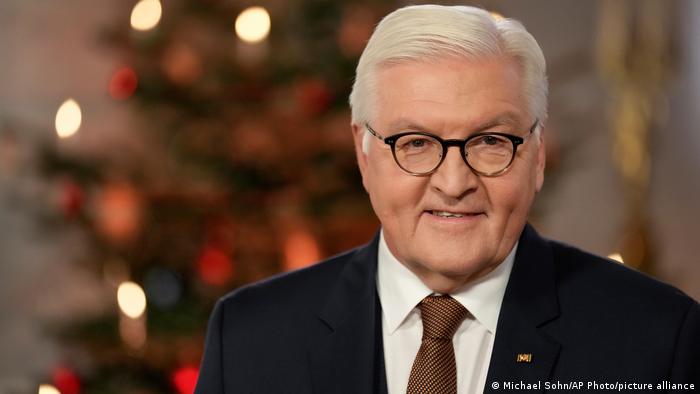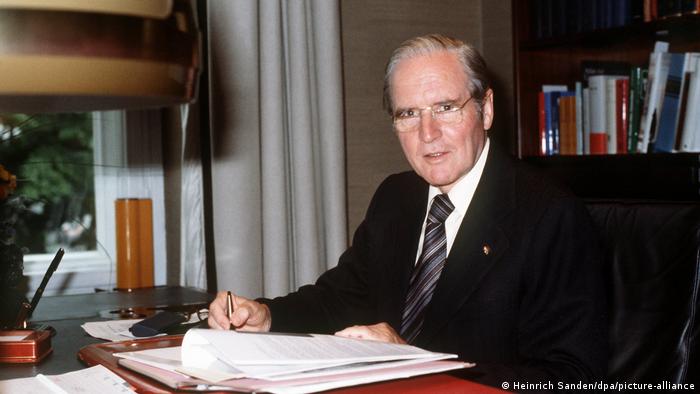Almost 1,500 delegates gathered in Berlin on Sunday to choose Germany’s president — a largely ceremonial position — for the next five years.
The so-called Federal Assembly (Federal Convention) consists of the members of Germany’s Bundestag, or lower house of parliament, along with an equal number of delegates chosen by the country’s 16 states, or Länder.
Among the latter delegates are some well-known personalities, including former Chancellor Angela Merkel, the national football coach, Hansi Flick, leading virologist Christian Drosten and the pianist Igor Levit.
Özlem Türeci, who as co-founder of the pharmaceutical company BioNTech was one of the driving forces behind the rapid development of the Comirnaty COVID-19 vaccine, is also among those selected to vote.
Who are the candidates?
Current President Frank-Walter Steinmeier, 66, a Social Democrat who served two stints as Merkel’s foreign minister and previously was chief of staff to Chancellor Gerhard Schröder, is widely seen as a favorite to win the election.
A recent opinion poll indicated that 85% of people living in Germany thought he was doing a good job, and he enjoys the support of both the ruling coalition and the mainstream conservative opposition parties.
The three other candidates are left-winger Gerhard Trabert, 65, who is running for the opposition Left Party, physicist Stefanie Gebauer, 41, who was nominated by a political group called the Free Voters, and Max Otte, 57, an archconservative economist chosen by the far-right party Alternative for Germany (AfD).
The latter choice made waves in the German political scene, as Otte is not a member of the AfD and remains a part of the mainstream Christian Democrats (CDU). The leaders of the CDU have voted to cancel his membership.
How does voting take place?
This time around, the Federal Convention is not meeting in the Reichstag as usual owing to pandemic regulations requiring the voters to remain 1.5 meters (5 feet) apart. Instead, the vote is taking place in the neighboring Paul Löbe House, with delegates spread over several rooms and floors.
-
Germany’s postwar presidents
Frank-Walter Steinmeier (2017-current)
Frank-Walter Steinmeier, a former foreign minister and chancellor candidate for the Social Democrats (SPD), was supported in his first election by the grand coalition of his party and Chancellor Angela Merkel’s Christian Democratic Union (CDU).
-
Germany’s postwar presidents
Joachim Gauck (2012-2017)
A former Lutheran pastor, Gauck came to prominence as an anti-communist civil rights activist in East Germany. A political independent, after German reunification he was in charge of the archives of East Germany’s Stasi secret service and tasked with investigating communist crimes. As a son of a Soviet Gulag survivor, his political life was formed by his own family’s experiences with totalitarianism
-
Germany’s postwar presidents
Christian Wulff (2010-2012)
Christian Wulf (CDU) was Germany’s youngest president to date. He is remembered for a high-profile speech he delivered in which he said that Islam “belongs to Germany” just as do Christianity and Judaism. The former State Premier of Lower Saxony stepped down in the face of corruption allegations, of which he was subsequently cleared.
-
Germany’s postwar presidents
Horst Koehler (2004 – 2010)
A trained economist, Horst Koehler served as president of the European Bank for Reconstruction and Development and head of the International Monetary Fund (IMF) before becoming German president. He stepped down over backlash against comments he made about Bundeswehr missions abroad, which he acknowledged also served to secure trade with Germany’s partners.
-
Germany’s postwar presidents
Johannes Rau (1999 – 2004)
Johannes Rau (SPD) served as premier of Germany’s most populous state, North Rhine-Westphalia, for ten years. As president, in times of heated political discussion, he urged the nation to open up to foreigners. “I want to be the president for all Germans and the partner for all people who live and work here without a German passport,” he said.
-
Germany’s postwar presidents
Roman Herzog (1994 – 1999)
The former Supreme Court judge is best known for a speech in 1997 demanding Germans pull themselves together and break the vicious circle of resignation, reform blockade. He is also remembered for asking Poland for forgiveness for the suffering inflicted by Germany in WW2, and declared the anniversary of the liberation of the Auschwitz concentration camp, as Germany’s official day of remembrance.
-
Germany’s postwar presidents
Richard von Weizsacker (1984 – 1994)
In 1985 the CDU politician articulated Germany’s responsibility for the crimes of Nazism. He defined May 8 as a “day of liberation” and challenged the idea that many Germans did not know about the Holocaust. “We Germans must look truth straight in the eye – without embellishment and without distortion. […] There can be no reconciliation without remembrance,” he said.
-
Germany’s postwar presidents
Karl Carstens (1979 – 1984)
Karl Carstens (CDU) was born in Bremen, the son of a commercial school teacher, who had been killed before his birth in WWI. Carstens studied law and political science and served in the air force during WWII. In 1940 he joined the Nazi Party, which made him a controversial choice for president. During his term in office he used his love of hiking to tour the country and meet the people.
-
Germany’s postwar presidents
Walter Scheel (1974-1979)
Scheel was born in Solingen, the son of a handyman. He trained at a bank before he was conscribed by Hitler’s Wehrmacht in 1939. After the war, Scheel worked as an economic consultant and joined the neoliberal FDP, which he moved towards an alliance with the SPD. Scheel was seen as jovial and is remembered for landing a hit with his recording of the German folk song “Hoch auf dem Gelben Wagen.”
-
Germany’s postwar presidents
Gustav Heinemann (1969 -1974)
Gustav Walter Heinemann (SPD) served as mayor of Essen, as well as interior and later justice minister before becoming president. He established the tradition of inviting ordinary citizens to the president’s New Year’s receptions, and in his speeches, he encouraged West Germans to overcome submissiveness to the authorities, to make full use of their democratic rights and to defend the rule of law.
-
Germany’s postwar presidents
Heinrich Lübke (1959 – 1969)
Heinrich Lübke (CDU) is remembered for a series of embarrassing lapses that may have resulted from health issues. Lübke resigned three months before the scheduled end of his second term amid a scandal around his involvement with the Nazi regime during World War II.
-
Germany’s postwar presidents
Theodor Heuss (1949-1959)
The liberal Theodor Heuss (FDP) beat Social Democrat leader Kurt Schumacher to become West Germany’s first postwar president. Before becoming a politician he was a political journalist. West Germans widely appreciated Heuss for his cordial nature.
Author: Rina Goldenberg
The vote is cast by secret ballot, with delegates called to the voting booths in alphabetical order.
The result is decided according to who wins the absolute majority of votes.
What does Germany’s president do?
While German presidents have little executive power, they aspire to be moral authorities above daily politics.
Anyone holding the office signs bills into law and represents Germany in various ceremonies both inside and outside the country.
During Steinmeier’s first term in office, he championed liberal democracy in Germany and abroad and urged dialogue on sensitive issues. Recently, that included plans for compulsory vaccination against the coronavirus.
tj/dj (dpa, AP)


















